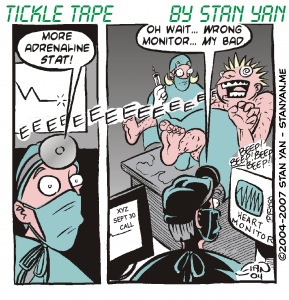At the end of the year, it’s tempting to examine the events of the past year, learn what you can from them, and start the New Year feeling that you can tackle anything the New Year throws at you. But you don’t want to take a scrupulous self-examination too far. Sometimes, we can waste a lot of time over-analyzing, and searching for lessons that just aren’t there. A little bit of introspection can be informative, but only when it is viewed in proper perspective.
For some people, it’s hard to put aside the past and devote full attention to capitalizing on the opportunities of the coming year. Casting aside the past can be difficult. There are many sound reasons for clinging to the past. First, we believe that we can learn important lessons by studying our past mistakes. Second, some people believe it’s impossible to shrug off the past. A common belief is that our personality, habits, and current performance are a function of our past experiences.
Third, there’s an emotional attachment to the past; if we cast our past history aside entirely, we fear we are also casting aside a vital part of ourselves. Despite these very good reasons, it’s useful to put the past behind us, especially memories or beliefs that interfere with our current functioning or future performance. Upon close examination of the reasons for clinging to the past, we find there are also good reasons for putting the past behind us, and moving forward.
Despite what we might think, past performance doesn’t necessarily dictate, or even influence, future performance. Psychologists who study optimal performance have discovered that individuals who achieve success tend to focus on the here-and-now, the immediate experience. Focusing on the past often causes anxiety. It precludes you from paying enough attention to your immediate experience, and the opportunities for success that are immediately ahead.
We may over-analyze and unnecessarily deliberate among equally plausible alternatives instead of just picking one and taking decisive action. There’s a tendency to think that there are more lessons to learn from our past mistakes than there really are. It may be useful to study past mistakes, but agonizing over the past isn’t useful. If a past mistake doesn’t have a lesson that is immediately apparent, you probably aren’t going to find it, or your psyche may not be ready to learn it.
That said, if you are willing to take an honest look at your past, there are a few lessons you can learn from it. If you keep a trading diary, for example, it’s useful to see if your trading decisions were impulsive or emotion-driven. It is also useful to determine which trading strategies produced profits and which ones didn’t, and make changes accordingly. The more you can take a close, hard look at what you are doing right and what you are doing wrong, the more you can adjust your trading methods and capitalize on new market conditions.
But taking an honest look is often difficult. Sometimes we just aren’t ready to see what we need to see. You must try to take an honest look, however, and the end of the year is a good time to take an inventory of what you are doing right and what you are doing wrong. You may want to take the rest of the week off; go to a quiet place, and look at your past trading records and account statements.
Go to a safe place, relax, and take an honest look at yourself. Digesting the cold, hard facts, and making a plan for working around them can spell the difference between staying in a trading rut and moving to a higher level of mastery. So use this time to take an honest but reasonable look at your past. You may find that the self-awareness you gain will help you trade more profitably in 2005.


